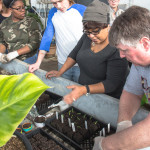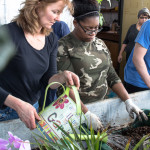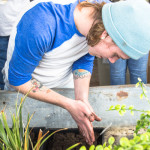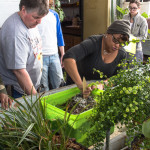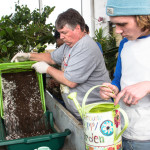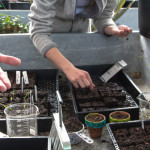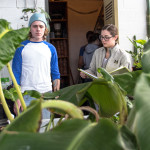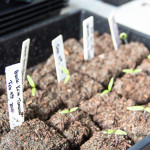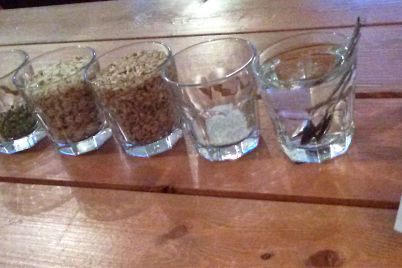By Natalie Wright
Editor
Kasey Shelton spent the last five of her 27 years sitting in a cubicle. One day she realized it wasn’t what she wanted.
“So you sit at your job every day and if you like it, you love it, and if you don’t, you think about what you’d rather be doing,” Shelton said. “For me it was food.”
Shelton, of Ypsilanti, quit her job working for an auto supplier, got a job at Whole Foods and signed up for culinary classes at Washtenaw. Now, she is studying baking and pastry, and is pursuing her interest in organic gardening in the Farm Harvesting and Management class that began this semester.
The class, which is a part of the culinary department, was developed by divisional counselor Kim Groce, as a support for the Core Garden project she spearheaded last year. It brings a body of labor to the garden that was desperately needed, Groce said, and gives her an opportunity to teach students, which is why she created the garden in the first place.
“It was always my plan to be able to teach students how to grow,” she said. “I didn’t know I would be able to actually have a class.”
When Vice President of Instruction Bill Abernethy had the idea to create a formal class, Groce was excited, she said, but also overwhelmed.
“We really only had six weeks. Normally it takes about a year to put together a whole new class.”
The course could have gone into a variety of areas, Groce said, like business or environmental science, but culinary is the best fit, she said.
“We can look at the concept of ‘farm-to-table’ and teach students the importance of growing and knowing where your food comes from,” Groce said.
Charles Schwarz, a student in the class and lifelong farmer, said that even if students continue to go to the grocery store for their fruits and vegetables, this class will help make them better consumers.
“All the time people at the grocery store put down a fruit or vegetable for a ‘better one,’ because it looks brighter; it’s shinier; it has more wax on it, but that doesn’t make it better,” Schwarz said.
Learning how to grow also means learning what to look for in the best food products.
Schwarz admitted that he was a little disappointed when the class started. A farmer all his life, Schwarz, who is in his 40s, signed up for the class expecting it to cover topics like fertilizing methods, farming machinery and crop rotation.
“The first day I showed up and said, ‘Where do I park my John Deere?’” he said. “Where’s my parking structure?” While the farm harvesting class wasn’t what he expected, he stayed with it, he said, because he felt he could learn something and that his experience would be valuable for others in the class.
“I would like to see them have a good agricultural farm program here, though,” he said.
Brook Miller, 40, said that although she has been gardening for five or six years, there is still so much to learn.
“I’ve only just started,” Miller said.
While some students have as much as 30 years of experience in growing and others have never been able to keep a plant alive, they all seem to agree that more goes into gardening than meets the eye.
“I didn’t know as much about gardening as I thought I did,” Shelton said. “You have to go back generations to learn the true and tried methods.”
Only nine students make up the class, and that’s “the only way it works” Groce said. The small class size allows for each student to have more hands-on time and helps to develop a sense of community and teamwork.
On their way up to the greenhouse atop the LA building, where seedlings are housed for the winter, the students crowded 10 to the elevator.
“Family style,” Groce said.
As the packed compartment carried them up, Miller asked Groce if she needed any help tending to the plants over break.
“Absolutely, I do,” Groce said. “I’m here every day, just let me know when you want to come in.”
Last summer, Groce tended to the garden mostly on her own, for months. It was a labor of love, but took a toll on her. Having students who are not only willing, but excited to help is a huge relief for her, though she is still keeping busy, she said.
“I can focus more on the administrative side and looking for grants to help support the garden project while the students do the more hands on experience,” she said.
But she doesn’t plan to give up all her weeding and watering responsibilities. “I’ll be out there as much as I can,” she said. “I’m never letting go.”
What: CUL 103: Farm Harvesting and Management
When: Spring semester, May 15–July 17, Fridays 1-6 p.m.
Where: TI 125
- Instructor Kim Groce, center, works with students Holden Knapp, 19, left, and Charles Schwarz, in the LA building’s greenhouse before they plant another batch of tomato seeds. The plants will remain in the greenhouse until the weather permits their transfer to the Core Garden. Gray Bancroft | Washtenaw Voice
- Culinary arts student Chris Colaner, 52, of Ypsilanti, left, and WTMC student Imani Johnson, 17, of Canton, add water to their soil mix to bond the dirt together. Gray Bancroft | Washtenaw Voice
- Holden Knapp, 19, a baking and pastry student of Manchester, rubs soil between his hands to check its consistency. Gray Bancroft | Washtenaw Voice
- Instructor Kim Groce, right, helps student Charles Schwarz, of Manchester, mix soil to be made into blocks. Gray Bancroft | Washtenaw Voice
- Students Charles Schwarz, left, and Holden Knapp, 19, both of Manchester, make a fresh batch of soil from which a new batch of seedlings will sprout. Gray Bancroft | Washtenaw Voice
- Students place seeds into freshly made soil blocks. Gray Bancroft | Washtenaw Voice
- Amidst a sea green, baking and pastry students Holden Knapp, 19, of Manchester, left, and Kasey Shelton, 27, of Ypsilanti, prepare for class. Gray Bancroft | Washtenaw Voice
- Tomato seedlings sprout from soil blocks, searching for light. Gray Bancroft | Washtenaw Voice

